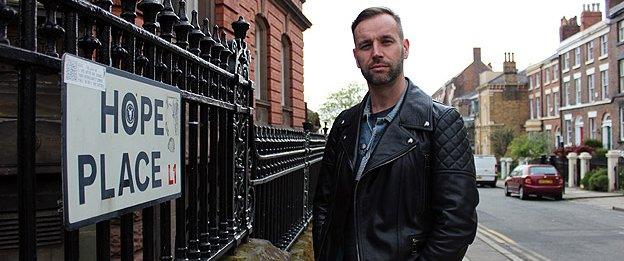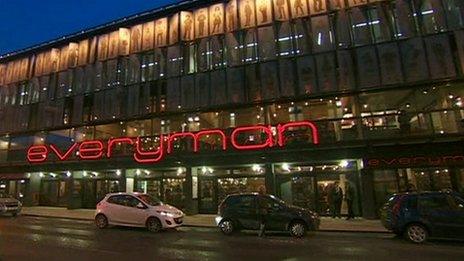Michael Wynne puts Liverpool myths and memories on stage
- Published

Michael Wynne's new play is named after the Liverpool street where his mother grew up
The Liverpool street where writer Michael Wynne's family once lived has provided the setting for his latest play, which charts the city's transformation through the decades.
When Michael Wynne went on a school trip to the Liverpool Everyman theatre in 1986 at the age of 14, it is fair to say it changed his life.
The city had been ravaged by industrial decline and was in the grip of real political drama as radical socialists in the city council battled the Conservative government.
At the Everyman, in an unsubtle nod to Margaret Thatcher, a woman was cast in the central role of the dictator in a high-energy adaptation of Bertolt Brecht's The Resistible Rise of Arturo Ui.
The teenage Wynne was suitably fired up. "From then on I was just hooked and I came and saw every production," he says.
"You'd come in the bar and all the actors would be playing music and they'd take over the whole theatre. And they'd just be so vibrant and alive. And if you went to the previews you could get tickets for 50p."
'Intimidated'
It was only when Wynne later moved to London he discovered theatre was supposed to be, in his words, "actually really poncey and elitist".
"When I went to London, I felt quite intimidated by things that I didn't get," he says. He never had that problem in Liverpool.
Now 41, Wynne, who actually grew up across the River Mersey in Birkenhead, has become known for writing BBC One's Being Eileen and the Olivier Award-winning comedy The Priory.
jonathankeenan.jpg)
In the play, a large Liverpool family rakes over the past following a funeral
He is returning to the Everyman - as a playwright rather than a punter - having written the first new play to be staged in the venue since its recent £27m redevelopment.
Titled Hope Place, the bittersweet saga takes its name from the street down the road from the theatre, where his mother spent her early childhood and where his great aunt still lives.
It is also, Wynne discovers after our interview, where the director of that pivotal production of The Resistible Rise of Arturo Ui, now resides. All paths lead to Hope Place.
The play tells the story of a large Catholic family - not entirely unlike his mother's - who grew up in one of the street's grand townhouses. Through them, he also tells the story of the city.
Following a funeral, the fictional family gathers in the Hope Place house where the five siblings once lived.
jonathankeenan.jpg)
Eileen O'Brien plays Maggie, who is troubled by ghosts from her past in Hope Place
A younger family member's boyfriend, who is studying oral history, begins to rattle some skeletons in the family closet when he decides it would be fascinating to interview the siblings. Family myths and city legends tumble forth.
Wynne's own mother was one of eight children. While researching the play, the writer took on the role of oral historian and talked to his mother, aunts and uncles about their childhoods.
"My uncle Frank is full of stories and always had been," he says. "There's loads of little bits [in the play] which are from him, and from my family. Hopefully nothing that will upset them."
Some tales - of using the cemetery of the Anglican Cathedral as a post-war playground (but never setting foot inside), or the children taking themselves on the Mersey ferry on their own to escape quarrelling parents - have found their way into the play.
"They would just play out in the street as little kids and would go out for hours," Wynne says.
"The idea that you'd see five and six-year-olds out on Hope Street, or that they would all head down the hill and go to the Pier Head and go to New Brighton, just the kids on their own, with loads of them in a pram... If you saw that today, you'd be, 'Where's the adult?'."
Wynne is at pains to point out that, borrowed family legends aside, the family in the play is not directly based on his own.
"There's a real sense of a lot of laughter within the family on stage, which relates to my family," he explains.
"But there's quite dark secrets within the family on stage, which there isn't really so much within mine. They're not a million miles away from my family, but they're not really [my family]."
Changing times
The play also tempers nostalgia with the sense that, while life may have been simpler when the young siblings had the run of the city, it was not easier.
The father in the script was a hard-drinking docker, and dockers did not know if they would be working from one week to the next. "They call it zero hours contracts now," one character quips.
Another character, while surveying the names and occupations on their family tree, remarks: "Everyone's got the same names. All Marys, Williams, Patricks and Catherines and dead interesting jobs. Coopers, shipbuilders, shoemakers, bottlemakers.
"Now it'd be all Cheryls and Chanices, and call centre, Asda, or dole, dole, dole."
Writing the play has made Wynne reflect on how the city has transformed since his mother spent her childhood on Hope Place.
It has changed "for the better on the whole", he believes, particularly since being European Capital of Culture in 2008.
"I think the city shines out more than it used to," he says. "It feels like a real world city.
"But you have that thing in a lot of northern cities - they call it the doughnut - the centre's really developed and there are lots of coffee shops and it's quite fancy.
"And then you go outside the city and there are still lots of problems, so it is quite complicated.
"But I do think Liverpool is unlike anywhere else, especially for a writer. There are lots of characters everywhere."
And he has drawn on his own memories of those teenage visits to the Everyman. He explains: "When I was writing this play I wanted a bit of the spirit of those productions."
Hope Place is at the Liverpool Everyman until 31 May.
- Published28 February 2014
brianroberts.jpg)
- Published28 February 2014
brianroberts.jpg)
- Published13 March 2014
